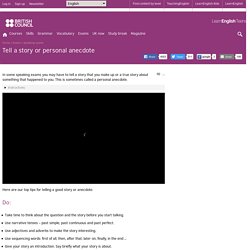

Pronunciation. Tell a story or personal anecdote. Examiner: OK, Kelvin, so I’d like you to tell us a short personal story.

Here are the topics. Please take one. Kelvin: Tell me about a great surprise you had. OK. Examiner: OK? Examiner: OK, Kelvin, you can start when you’re ready. Kelvin: OK. Examiner: Yeah, what a great surprise! Kelvin: Actually, no, because they hadn’t mentioned anything about my birthday before the match, so I hadn’t expected they would do this. Examiner: OK. Examiner: OK, Melissa, so now I’d like you to tell us a short personal story or anecdote and here are the topics. Melissa: OK. Examiner: What have you got? Melissa: Tell me about a time when you surprised someone.
Examiner: OK, great. Examiner: OK? Examiner: OK, so you can start when you’re ready. Melissa: It was my best friend’s birthday and I decided to give her a surprise since we have been good friends since Form 3. Oral presentation. Melissa: Hi, everyone! Today I would like to talk about how to become the most popular teen in school. Firstly, I think getting good academic results is the first factor to make you become popular since, having a good academic result, your teacher will award you in front of your schoolmates.
Then, your schoolmates will know who you are and maybe they would like to get to know you because they want to learn something good from you. Secondly, I think participating in school clubs and student unions can help to make you become popular, since after participating in these school clubs or student union, people will know who you are and it can help you to make friends all around the school, no matter senior forms or junior forms. In conclusion, I think to become the most popular teen in school we need to have good academic results and also participate in school clubs and student union. Group discussion skills. Group discussion skills Submitted by admin on 17 June, 2010 - 19:57 Group discussions occur in many different formats – from very informal ones between friends to highly structured and challenging discussions included as part of a selection process.

In both cases, there are a number of specific skills that we can help our students develop to become better able to contribute effectively to group discussions. Why teach group discussion skills? Types of discussion Useful sub-skills for students Setting up group discussions Giving and encouraging feedback Conclusion Why teach group discussion skills? Additionally, group discussions are increasingly being used in the job market during interviews and selection procedures. Types of discussion There are a variety of different types of discussions that occur naturally and which we can recreate in the classroom. You can then give them or elicit a list of phrases which they might use to interrupt politely (e.g.
Learn Languages For Free Through Music Videos, Lyrics and Karaoke! English, Spanish, French, German, Italian, Portuguese and Dutch. Euronews : l'actualité internationale en image et sans commentaires. Sixteen Sensational Storytelling Ideas. LCS. LCS. English Text To Speech, TTS: English, Spanish, French, Russian, Italian, German, Portuguese, Korean, Japanese, Chinese. This natural sounding text to speech service reads out loud anything you like in a variety of languages and dialects in male and female voices.

The TTS service speaks Chinese Mandarin (female), Chinese Cantonese (female), Chinese Taiwanese (female), Dutch (female), English British (female), English British (male), English American (female), English American (male), French (female), German (female), German (male), Hindi (female), Indonesian (female), Italian (female), Italian (male), Japanese (female), Korean (female), Polish (female), Portuguese Brazilian (female), Russian (female), Russian (female), Spanish European (female), Spanish European (male), Spanish American (female).
Just type a word or a phrase, or copy-paste any text. Choose the speech rate that works for you. Start from any position on the text. Replay the text as many times as you wish. Use this service to practice your listening and speaking skills, or master your pronunciation in foreign languages. Translate and Speak. How to Use ImTranslator Translate and Speak • How to translate text and listen to the translation Do the following:• make sure that the Translate check mark box is ON• choose the target language for translation• adjust the speed of the voice• enter text or copy and paste text into the text window• press the Translate & Speak button ImTranslator will:• automatically detect the language of the text if the language detection was not correct, manually choose the language of the source text from the Translate drop-down box• translate text into the chosen language• convert the translated text into speech• read the text• highlight pronounced words• show the translation in the translation window• offer an option to create an audio link with a spoken text to embed it into an email, chat room, instant messenger or web site • How to play the voice without translation • How to create a link with a spoken text.
